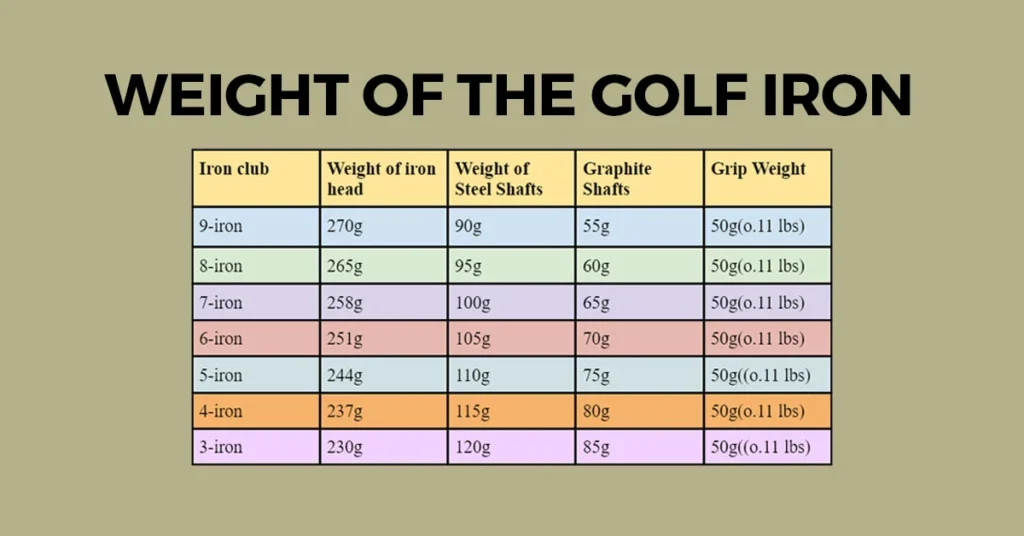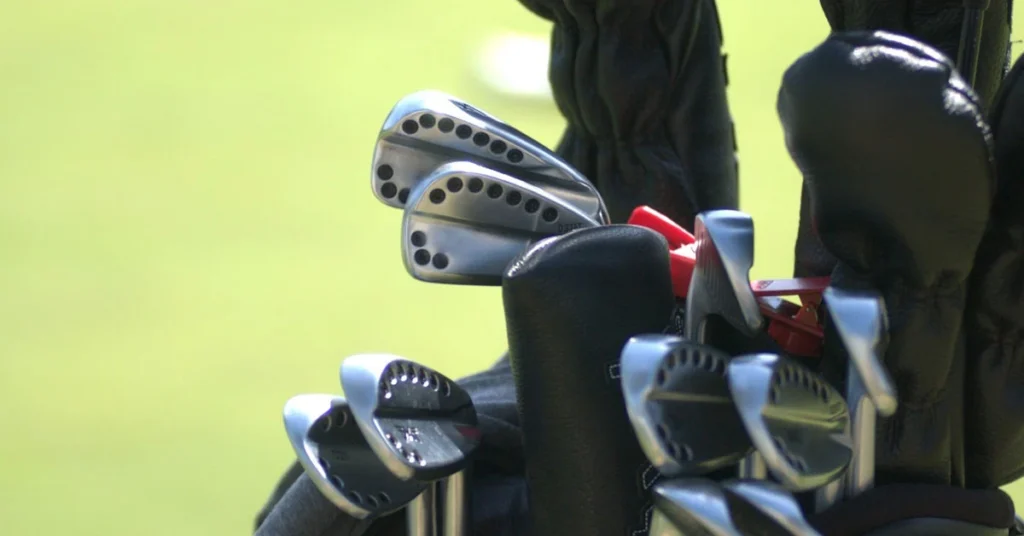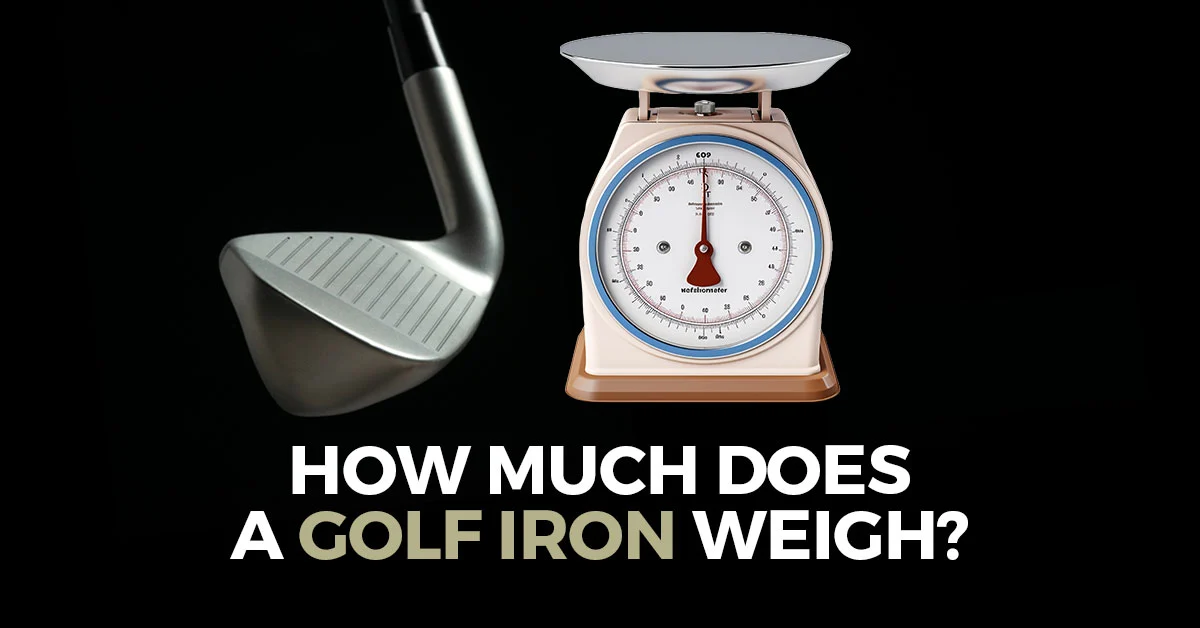Among all the golf clubs, your irons play a very vital role in improving your golf game on a course. The alchemists of the golf bag are golf irons—strike the perfect balance between power and accuracy, enabling a golfer to realize their intent with every well-weighted swing.
Golf Irons are available in many different weights. The weight of a golf iron can have a big influence on your game. If you are a person who is thinking about which golf iron weight is best for you and How much a golf iron weighs, then you are at the right place to solve your query.
In this guide, I am going to highlight the weight of different irons, and by the end of this guide, you will get to know How much Golf irons weigh?
How Much Does a Golf Iron Weigh?

The weight of a golf iron can change based on several variables, including the model, materials used in construction, and the type of iron (3-iron, 7-iron, pitching wedge, etc.). The usual weight range for golf irons is between 270 and 310 grams or more.
The weight of a golf iron can range from 0.88 to 0.97 pounds. The iron’s head, shaft, and grip add to its importance. The 3-iron is the lightest iron in the set, weighing about 400 grams (0.88 pounds), and the 9-iron is the heaviest, weighing about 440 grams (0.97 pounds). The table below shows the weights of different types of iron clubs.
- The table given will help you know the weight of the golf iron.
Since the average shaft and grip weights of 120 grams (0.26 pounds) and 50 grams (0.11 pounds) have not changed, the main cause of the weight difference between the irons is the variation in head weight.
Golf Clubs Average Weights
Understanding the average weight of golf clubs can significantly impact your swing mechanics, ball control, and overall performance on the course. Each type of club—whether a driver, iron, hybrid, wedge, or putter—is designed for a specific purpose, and its weight plays a vital role in how it performs.
Let’s break down the typical weights across various types of golf clubs:
Weight of Woods
Woods are generally the lightest among the clubs designed for distance. On average, a standard driver weighs between 300 to 350 grams. Their lightweight build allows for faster swing speeds and longer shots. Choosing between options like ladies flex vs senior flex shafts often comes down to shaft weight, which can dramatically affect your tempo and control.
Weight of Irons
Irons are engineered for precision and control. These clubs typically weigh between 400 to 500 grams, depending on the number and material used—steel irons are heavier and offer more feedback, while graphite irons are lighter and more forgiving. The higher the iron number (e.g., 9-iron), the lighter the club tends to be. Weight is a key factor to consider, especially for players managing swing speed and balance.
Weight of Hybrids and Wedges
Hybrid golf clubs, which blend characteristics of woods and irons, usually weigh between 370 to 450 grams. Their design helps players achieve better launch and forgiveness. If you’re optimizing your game based on hybrid golf club distances, understanding weight can guide you in choosing the right club.
Wedges, designed for short game precision, fall in the 400 to 500 grams range. Whether you’re hitting a flop shot or escaping a bunker, the weight contributes to feel and spin control around the greens.
Weight of Putters
Putters are slightly different, focusing more on stability than distance. They typically weigh between 300 to 400 grams. A heavier putter head promotes a smoother stroke and better accuracy on the greens. For golfers exploring professional club fitting services, high-end facilities like The Concession Golf Club are known for offering customized putter weights that match individual stroke styles.
Why Club Weight Matters?
Choosing the right club weight can impact everything from swing speed to shot consistency. Lighter clubs may help increase clubhead speed, while heavier ones offer greater control. Custom fitting or experimenting with shaft flex, grip weight, and clubhead design can further fine-tune your game.
Are Carrying Golf Irons Heavy?
The weight of golf irons, including carrying-style irons, can vary depending on design, materials used, and club specifications. In general, golf clubs are made to be relatively light to facilitate better control and comfort during the swing, but they may significantly increase the weight of your golf bag.
Irons are designed to offer precision and versatility to golfers in shots. The particular weight of irons to be carried can vary depending on the manufacturer’s materials, model, and brand.
If you are worried about the weight of your golf irons, especially if you plan to carry them around, consider trying out some different clubs or getting a professional club fitting.
In summary, how well the irons perform on the course is more important than their weight. Therefore, you can’t replace your current irons if you’re happy with them.
Do Professional Players use Heavy or Lightweight Irons?

Like any other golfer, professional players have personal preferences regarding the weight of their irons. Experienced players may use a range of iron weights depending on their swing characteristics, playing style, and comfort level, so there is no one-size-fits-all answer.
Some professional golfers choose heavier irons for improved control, stability, and a more even feel throughout the swing; Some might choose lighter irons to increase their swing speed and skill.
So, choosing irons for the game, whether one is a beginner golfer or a professional golfer, depends on their preferences and needs.
Light Irons Vs Heavy Irons:
Regarding light vs. heavy iron clubs, keep the following points in mind:
Light Weight Iron Clubs:
Lighter clubs are frequently easier to swing fast. , It is beneficial for golfers with slow swing speeds.
Lightweight golf clubs allow golfers to increase their distance at a course.
Lighter clubs are ideal for those with trouble with timing or coordination, as golden clubs provide more control.
Heavy Weight Iron Clubs:
Heavier clubs offer better stability during the swing, ideal for those who want a consistent feel.
Some golfers believe heavier clubs offer a more reliable and consistent strike, particularly for those with a faster swing speed.
G golfers who like a more substantial feel in their hands may prefer weightier clubs.
Choosing between light and heavy clubs is frequently a matter of personal preference. Injured golfers or those with physical restrictions might find one weight category more appropriate for their needs. For instance, people who have joint problems might like lighter clubs.
Which iron club—light or heavy—is right for you depends on your preferences, swing type, and physical attributes. Experimenting with various options is crucial to finding the ideal choice for yourself.
Factors Affecting Golf Club Weight:
When selecting the right golf clubs, understanding what affects their weight can make a noticeable difference in your performance. The weight of a golf club isn’t arbitrary—it’s the result of several design choices that influence everything from swing speed to shot accuracy. Let’s break down the most important factors:
1. Type of Club
Each type of golf club is built with a specific purpose, and that purpose heavily impacts its weight.
- Woods and drivers are designed for maximum swing speed and distance, so they are typically lighter. A lighter clubhead allows for faster clubhead speed, which translates to longer drives.
- Irons and wedges, in contrast, are heavier to provide more control and precision. Their extra weight helps you manage shorter shots with better consistency and feel.
So, when choosing between clubs, always factor in the club type and what part of your game it’s meant to support.
2. Materials Used in Construction
The materials used in the club’s shaft and head can significantly alter its weight—and by extension, its performance.
- Titanium and carbon composites are common in modern drivers and fairway woods. These lightweight materials reduce overall club weight, making it easier to swing faster with less effort.
- Steel, often found in iron shafts and putters, adds weight and promotes stability and feedback—ideal for players who value control and consistency.
- Graphite shafts, popular among senior and beginner golfers, are lighter and help generate more swing speed with less strain.
Even hybrid golf clubs, which combine characteristics of woods and irons, are affected by material choice. These clubs often use a blend of materials to balance weight, forgiveness, and distance—making them a versatile option for many golfers.
Why It Matters?
Understanding what influences golf club weight can help you make more informed decisions during club fitting or when shopping for new gear. A club that’s too heavy or too light can negatively affect your swing mechanics, shot trajectory, and overall enjoyment of the game.
Whether you’re optimizing for distance, control, or consistency, considering the type of club and materials used ensures your equipment matches your playing style.
Conclusions:
In conclusion, How much does a golf iron weigh? A golf iron’s weight is more than just a figure on a specification sheet; it plays a vital role in the complex move-around between the club and the player.
Selecting the appropriate weight for your game because golf irons are available in various weights. A lighter golf iron will help you if your swing speed is slower.
If you have a quick speed, using a heavier golf iron is helpful to keep more control over your shots and keep them from veering too far off course with the heavier weight.
So, it is crucial to test out various weights until you determine which one works best for your style of play. Every golfer has a different “ideal” weight, so choose the one that suits you the best and stick with it.
Thanks for reading. After reading this full guide on how much a golf iron weighs, I hope you are confident and will choose the perfect iron weight suitable to your game and skills. Read our article on Best iron sets for seniors and how long do golf irons last?
Frequently Asked Questions:
How much does a Typical Iron Golf Club Weigh?
A typical iron golf club’s weight usually falls into one of several ranges. This can change depending on things like the materials used to build the club and its number, the 3-iron is the lightest iron in the set, weighing about 400 grams (0.88 pounds), and the 9-iron is the heaviest, weighing about 440 grams (0.97 pounds).
Which iron clubs should I choose—lighter or heavier?
Depending on your playing style, swing characteristics, and personal preferences, you can choose between heavier and lighter clubs. While some golfers choose the added speed of lighter clubs, others prefer the feel and control of heavier clubs.
What is the weight of a 7 iron?
The average 7-iron weighs 430–450 grams. Steel shaft versions are heavier (~445–450 g), while graphite shafts are lighter (~430–440 g). Weight can vary by brand, shaft type, and grip size.
What makes a golf club heavy?
A golf club feels heavy due to factors like a steel shaft, heavier clubhead, longer shaft length, or thicker grip. Steel adds mass for control, while added weight in the head or grip shifts balance and affects swing feel. Custom fittings or lead tape can also increase overall weight.
Q: How do I determine the weight of my golf clubs?
You can determine your club’s weight using a digital kitchen scale or golf swing weight scale. For accurate results, weigh the entire club (head, shaft, and grip). Check the manufacturer’s specs for component weights or consult a club fitter for precise swing weight analysis.


